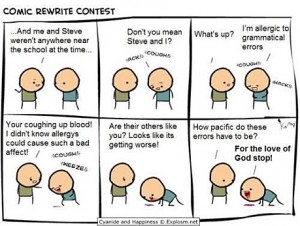The subject-verb agreement in a sentence seems simple on the surface, but this concept can trip up even those who should seemingly know better. Recently, I witnessed a thread on a popular social media platform. A friend of mind posted something similar to the following (the actual post and responses have been changed to protect the innocent and the guilty): “Making muffins have helped my diet plan.” She then specifically called out an elementary school teacher to ask if she should have used the verb “have” or “has.” This teacher then pontificated at great length about how she chose correctly because “muffins” plural, making the choice of the plural verb “have” correct. Ummm… No.
So, let’s review subject-verb agreement, shall we? The simple case – singular verbs require the use of singular verb forms, and plural verbs require the use of plural verb forms. For example:
“The bird sings a beautiful song. The birds sing a beautiful song.”
A prepositional phrase or any other phrase separating the subject from the noun does not change the verb form. Take the following sentence as an example:
“The bird with the many colors sings a beautiful song.”
In our original example, the sentence is a little more tricky because the subject of the sentence is a gerund (i.e., “making muffins”), not “muffins.” Given that the subject is the gerund “making muffins,” the verb should be singular (i.e., “has”). Therefore, the correct sentence is “Making muffins has helped my diet plan.” If you think about the subject of the sentence as “the act of making muffins,” this makes identifying the need to use a singular verb more straightforward.
Honestly, there are several more factors to consider regarding subject-verb agreement. For example, certain sentences are formed in such a way that the subject comes after the verb (e.g., questions and sentences starting with “there” or “here”). For example:
“Where are the children?” “There are five girls on the team.” “Here is the plan for the game tonight.”
For a complete list of rules on subject-verb agreement, see a very good article by Your Dictionary (20 Rules of Subject Verb Agreement).
Remember that the only part of the sentence that can affect the verb is the subject.

